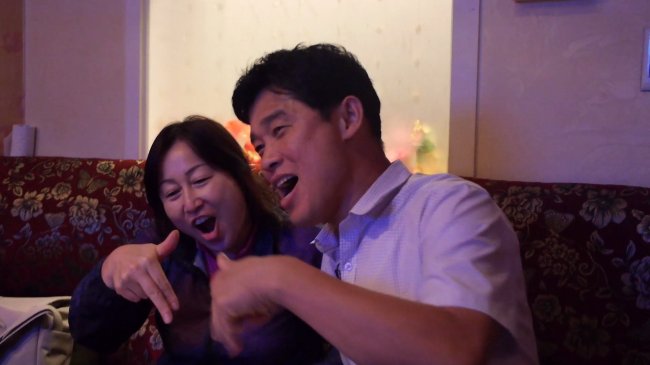[Herald Review] Two families with disabilities, two very different stories
By Won Ho-jungPublished : April 21, 2015 - 19:33
Two films about families struggling with disabilities will hit theaters side by side on April 23, three days after the designated national day to raise awareness about physical disabilities. Despite their common subject matter, the films present a striking contrast in their portrayals of life with disabilities.
The first film is “Glittering Hands,” the first full-length feature film from 25-year-old Lee-Kil Bora that received accolades at the Seoul Independent Film Festival and the Persons with Disabilities Film Festival. It is an autobiographical documentary that takes the audience through her life as the daughter of two parents with hearing impairments.
Lee-Kil herself is rarely seen on screen, but she narrates throughout the documentary about how she and her brother, both of whom can hear, learned to bridge the worlds of silence and sound from a young age. She described the documentary as an introduction to her parents’ world.
The first film is “Glittering Hands,” the first full-length feature film from 25-year-old Lee-Kil Bora that received accolades at the Seoul Independent Film Festival and the Persons with Disabilities Film Festival. It is an autobiographical documentary that takes the audience through her life as the daughter of two parents with hearing impairments.
Lee-Kil herself is rarely seen on screen, but she narrates throughout the documentary about how she and her brother, both of whom can hear, learned to bridge the worlds of silence and sound from a young age. She described the documentary as an introduction to her parents’ world.

“I think the people with disabilities that we see in the media are very different from disabled people in the real world,” Lee-Kil said at a press conference on April 14 at the KT&G SangsangMadang theater in Mapo-gu, Seoul. “The message is always, ‘Look at their positivity, how they overcome their disabilities. We should all work harder and appreciate life, just like they do.’ But there’s so much more,” she said. “I wanted to show the beauty of my parents’ world, to ask audiences to see them as simply having a culture of their own.”
In the film, the “culture” of people with hearing impairments seems no more foreign than that of an unfamiliar country, needing subtitles but readily accessible. Lee-Kil’s parents, Sang-kuk and Kyung-hee, never turn pedantic about counting their blessings. They are charming and witty, her father a boyish and romantic man who is constantly chastised by her fiercely independent and no-nonsense mother. Following them as they have their meals, watch television and make kimchi, one almost forgets that they are people living with a disability.

That is, until the last scene, when the family goes to sing karaoke. It’s jarring, hearing a person with a hearing impairment sing. The words are slurred, and the melody and tempo are nonexistent. It is a moment when the worlds of silence and sound collide.
The scene is long ― almost awkwardly so ― but it is an excellent representation of what Lee-Kil said she hoped to achieve: “(My parents’ world) is one that is a little uncomfortable, but a little special, so mundane at times, but extraordinary in others. I wanted to portray the unexpected beauty of that world.”
Opening on the same day as “Glittering Hands” is the French film “De toutes nos forces” from director Nils Tavernier, presented under the title “Thank You, Daddy” in Korea. The film, adapted from a true story, follows a father and his disabled son as they challenge themselves to finish the 3.8-kilometer swim, 180-kilometer bike and 42-kilometer run that compose the brutal Ironman triathlon. Unlike “Glittering Hands,” which downplays the difficulties of living with disability, “De toutes nos forces” emphasizes them ― to make the film’s central feat even more astounding.
The film follows the standard arc of a sports film, with the wheelchair-bound Julien (Fabien Heraud) struggling to connect with his gruff, detached father Paul (Jacques Gamblin). Although Julien, who suffers from cerebral palsy, is given some depth as a stubborn, rebellious teenager who spies on his naked neighbor through a telescope and even runs away from home to get his way, the other characters, including Paul, are two-dimensional at best.
Julien’s mother is overbearing and doting, his sister is loving and supportive, and his friends are little more than props. It is clear from the beginning what role each character will play and how the story will unfold.
“De toutes nos forces” does the opposite of what “Glittering Hands” does ― it exaggerates sentiments and takes the audience on a feel-good trip through an easily understood portrayal of a family that struggles with a disabled member. Complete with Heraud’s million-watt smile and soaring, breathtaking aerial shots of the mountains near Nice and the Ironman competition, “De toutes nos forces” delivers a satisfying emotional punch, if little insight into the less picturesque challenges faced by families such as Julien’s every day.
By Won Ho-jung (hjwon@heraldcorp.com)





![[Herald Interview] 'Amid aging population, Korea to invite more young professionals from overseas'](http://res.heraldm.com/phpwas/restmb_idxmake.php?idx=644&simg=/content/image/2024/04/24/20240424050844_0.jpg&u=20240424200058)











![[KH Explains] Korean shipbuilding stocks rally: Real growth or bubble?](http://res.heraldm.com/phpwas/restmb_idxmake.php?idx=652&simg=/content/image/2024/04/25/20240425050656_0.jpg&u=)

